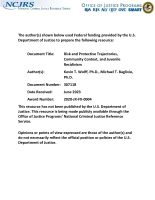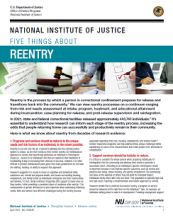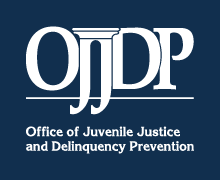Community corrections
The Extremism Sentencing Study: Judicial Outcomes and Recidivism Among Individuals Convicted of International and Domestic Terrorism
The price of a sex offense conviction: A comparative analysis of the costs of community supervision
Juvenile Court Statistics, 2020
Imperfect Tools: A Research Note on Developing, Applying, and Increasing Understanding of Criminal Justice Risk Assessments
Risk and Protective Trajectories, Community Context, and Juvenile Recidivism
Five Things About Reentry
NIJ Director Nancy La Vigne Discusses Evidence-Based Strategies for Successful Reentry
NIJ Director Nancy La Vigne highlights the importance of evidence-based strategies for successful reentry. This strategy emphasizes the need for tailored and holistic support that starts during confinement and continues after release, with a focus on family involvement, cognitive-behavioral therapy, and community supervision.
See the YouTube Terms of Service and Google Privacy Policy
Translating Evidence-based Practices from Community to Corrections: An Example of Implementing DBT-CM
Inclusive Research: Engaging with the People Closest to the Issue
See the YouTube Terms of Service and Google Privacy Policy
Criminal justice forecasts of risk: A machine learning approach
Machine learning risk assessments in criminal justice settings
Examining the Role of Responsivity Factors in Juvenile Probation Outcomes
Gender and community supervision: Examining differences in violations, sanctions, and recidivism outcomes
A Supervision Policy with Scope: Revisiting Washington State's Swift-and-Certain Initiative
Revisiting Washington State's Swift-and-Certain Initiative
Desistance from Crime: Interventions to Help Promote Desistance and Reduce Recidivism
No single criminal justice agency can promote desistance on its own. Partnerships across state, local, and federal agencies — along with the support of family and community stakeholders — are instrumental in supporting desistance from crime and reducing recidivism.
Law enforcement, courts, corrections, and community supervision agencies play a key role in the desistance process and reducing recidivism.
See the YouTube Terms of Service and Google Privacy Policy






